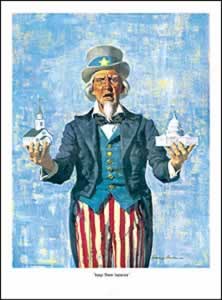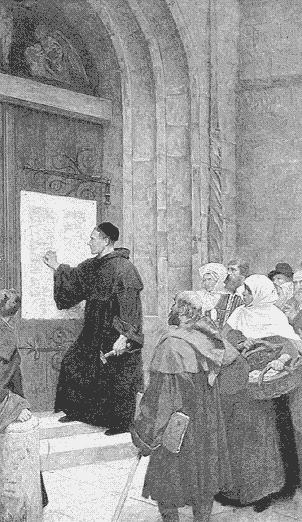 Rushdoony’s Legacy: The Overlooked Influence Of A Religious Right Godfather
Rushdoony’s Legacy: The Overlooked Influence Of A Religious Right GodfatherThe nuances of the Religious Right are admittedly sometimes hard to follow. But I was still surprised on Saturday morning to read a seriously misguided Washington Post article that touched on Christian Reconstructionism. As a matter of fact, I almost turned over my bowl of Cheerios.
Reporting on the Senate race in Nevada, The Post’s Amy Gardner asserted that Christian Reconstructionism, the most hardline faction of the Religious Right, is and always has been pretty much irrelevant.
“At its peak in the 1990s,” the article said, “the Christian Reconstructionist movement was small and mostly ignored. The group’s founder, R.J. Rushdoony, tried to start a political party, but it went nowhere. When Rushdoony died nine years ago, the movement dried up.”
Most of this, of course, is quite wrong.
It’s true that most Religious Right activists don’t buy into all aspects of Christian Reconstructionism. Only the most hard-hearted fanatics are willing to endorse slavery or the stoning of miscreants. The Old Testament may prescribe the death penalty for adultery, as Rushdoony argued, but most Americans probably don’t want to see that penalty written into criminal law (do we, Newt?).However, Rushdoony’s overarching philosophy – that secular democracy is evil and that God’s law should prevail in today’s America – became the theological and intellectual framework for early Religious Right activists.
When fundamentalists flocked into politics in the late ‘70s and early ‘80s, they had few theorists to turn to. They had always believed politics was worldly, and true Christians should focus on converting souls, not running the government. Rushdoony insisted that God wanted them to take over society and crush the infidels (literally).
Robert Billings, an early Religious Right strategist, said, “If it weren’t for [Rushdoony’s] books, none of us would be here.”
The Rushdoony influence on the Religious Right continued throughout his life. He helped birth the home-school movement that has replenished Religious Right’s ranks, and he was an early member of the Council for National Policy, the secretive meeting ground for right-wing heavy-hitters. His ideas popped up in all sorts of places, from Pat Robertson’s “700 Club” to D. James Kennedy’s Coral Ridge Ministries.
When Rushdoony died, the neo-con Weekly Standard ran a fawning tribute, hailing his impact on American life. Today, Rushdoony acolytes continue the battle on a variety of fronts too numerous to mention here.
The Georgia-based American Vision, for example, spreads the Reconstructionist viewpoint through a variety of mediums. Its 2007 conference, at a Southern Baptist conference center in North Carolina, drew hundreds of attendees. That same year, many PBS(!) stations ran a documentary on church and state written by Brian Godawa, a one-time movie reviewer for Rushdoony’s foundation. Reconstructionist guru (and Rushdoony son-in-law) Gary North was once a staffer for Rep. Ron Paul.
The mainstream media has a disconcerting habit of declaring the Religious Right dead at regular intervals. Reporters killed it off when the Moral Majority went under, and again when the Christian Coalition went into eclipse. Some have done it in recent years as James Dobson was elbowed (somewhat less than gently) into quasi-retirement.
The Religious Right is still here, of course. It no longer has prominent spokesmen on television such as the late Jerry Falwell, but his ideological allies operate influential political entities in Washington and the state capitals. And they are often influenced, directly or indirectly, by Reconstructionism.
It’s best to take these obituaries of the Religious Right with a grain of salt. So, too, the Post obit on Christian Reconstructionism.
The Wall of Separation
















0 comments:
Post a Comment